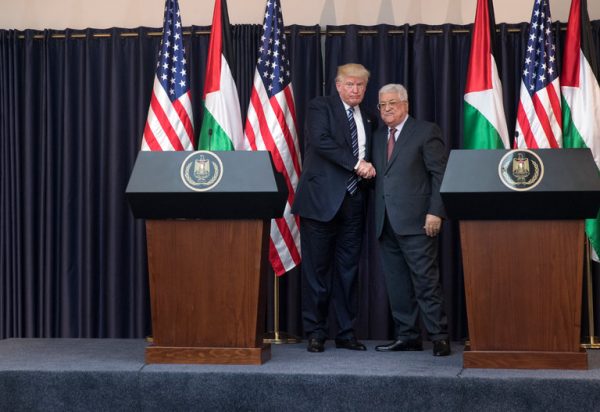
President Donald Trump said he’s “truly hopeful” America can help Israel and the Palestinians broker a peace deal following his meeting with Palestinian President Mahmoud Abbas today.
“I am committed to trying to achieve a peace agreement between the Israelis and the Palestinians and I intend to do everything I can to help them achieve that goal,” President Trump said on his visit to Bethlehem in the West Bank, the next stop on his eight-day overseas trip.
The visit follows Trump’s meetings with Israeli President Reuven Rivlin and Prime Minister Benjamin Netanyahu, in which he repeatedly expressed optimism for a peace settlement, despite his predecessors’ inability to reach a lasting deal.
“[Abbas] assures me he is ready to work towards that goal in good faith and Prime Minister Netanyahu has promised the same,” said Trump, standing next to Abbas at the Presidential Palace.
President Trump also offered his condolences to the families of the victims and those injured in the terror attack overnight in Manchester that left 22 dead and 59 others injured.
“We stand in absolute solidarity with people of the United Kingdom,” Trump said. “So many young, beautiful, innocent people living and enjoying their lives murdered by evil losers in life.”
Trump also commented that “it’s so interesting” his meeting with Abbas took place “on this very horrible morning of death to innocent young people.”
“We must be resolute in condemning such acts in a single unified voice,” Trump said, seeming to allude to criticism from Israel that Palestinians are too hesitant to condemn attacks initially.
In a meeting at the White House three weeks ago, Trump called on Abbas to demand that Palestinian leaders condemn any and all violence against Israelis, and Abbas spoke out strongly against Israel’s occupation of the West Bank.
The administration has been confronted with thorny diplomatic realities during Trump’s whirlwind overseas tour, specifically his decision to visit the Western Wall.
A junior U.S. official caused an uproar among many Israeli officials during a presurvey of the site, when he said that the Western Wall was not in Israeli territory but “is part of the West Bank.”
After the incident, U.S. Ambassador to the U.N. Nikki Haley deviated from long-standing U.S. policy by saying the Western Wall is part of Israel, leading to protest from many Palestinians. Secretary of State Rex Tillerson, asked about Haley’s comments, reiterated traditional U.S. policy, saying, “The wall is part of Jerusalem.”
After meeting with Abbas, Trump will visit the Yad Vashem Holocaust memorial, where he will lay a wreath and deliver brief remarks. It could be an awkward moment for White House press secretary Sean Spicer, who in April was the target of a stinging statement from Yad Vashem over his controversial comparison between Adolf Hitler and Syrian President Bashar al-Assad during a press briefing.
“Yad Vashem expresses deep concern regarding the inaccurate and insensitive use of terms related to the Holocaust by the White House press secretary,” according to a statement from the memorial. “His statements imply a profound lack of knowledge of events of the Second World War, including the Holocaust. Moreover, they are liable to strengthen the hands of those whose goal is to distort history.”
Spicer repeatedly apologized after the episode.
After the wreath-laying ceremony, Trump will deliver an address at the Israel Museum to the Israeli people. That follows his address on Sunday in Saudi Arabia to leaders of Muslim countries, in which he called on them to “drive out” extremists and terrorists.
ABC

Leave a Reply
You must be logged in to post a comment.